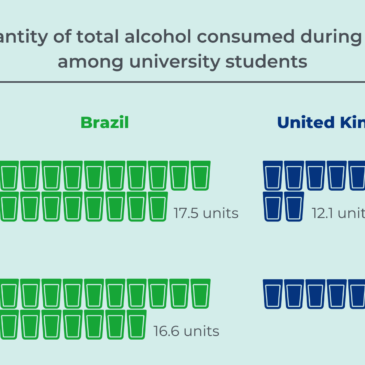Pre-drinking, or consuming alcohol in a private setting before going to a public event, is common among young adults, often with the motivation to save money. Participating in pre-drinking has been associated with higher alcohol use and with physical violence. Brazil’s alcohol regulation policies have considerable gaps, so examining pre-drinking practices in Brazil and comparing them to practices in a country which has stronger alcohol control policies (e.g., the United Kingdom) can help inform future policy implementation. This week, The DRAM reviews a study by Mariana G. R. Santos and colleagues that compared the pre-drinking practices and associated harms among university students in Brazil and the UK.
What were the research questions?
What are the pre-drinking practices among university students in Brazil and the UK? What alcohol-related harms are associated with pre-drinking?
What did the researchers do?
Between March and July 2017, researchers recruited undergraduate and postgraduate students at two universities, one in Brazil, one in the UK. Students at least 18 years old (the legal drinking age in these countries) who reported drinking alcohol completed an online survey about their pre-drinking practices, nightlife drinking habits, and experiences of alcohol-related harms in the nightlife context over the past twelve months. The sample included 1,151 Brazilian students and 424 UK students. The researchers used Chi-Square tests and logistic regression to examine differences between Brazilian and UK students.
What did they find?
Most UK students (82.8%) reported pre-drinking, compared with under half of Brazilian students (44.0%). However, regardless of whether they were pre-drinkers, Brazilian students reported drinking more total alcohol than UK students (see Figure). Compared to non-pre-drinkers, pre-drinkers in both countries were more likely to experience alcohol-related harms after going to nightclubs, bars, and pubs. More types of harm were associated with pre-drinking among Brazilian students than pre-drinking among UK students.
Figure. Median quantity of total alcohol consumed during a night out among university students in Brazil and the UK. Click image to enlarge.
Why do these findings matter?
Regardless of country, students who participated in pre-drinking were more likely to consume more alcohol and experience alcohol-related harms than non-pre-drinkers. Education about and prevention of pre-drinking practices may help reduce excessive drinking and alcohol-related harms. Alcohol control policies also appear to play a role in alcohol consumption and its associated harms. Brazil has established minimal alcohol control, while the UK has introduced policies such as minimum pricing of alcohol. In this study, Brazilian students reported drinking more alcohol and more types of harm associated with pre-drinking than their UK counterparts. Countries should consider implementing alcohol control policies to discourage pre-drinking, limit excessive alcohol consumption, and reduce alcohol-related harms.
Every study has limitations. What are the limitations in this study?
Students completed a cross-sectional survey, so it cannot be determined whether pre-drinking caused students to experience alcohol-related harms. Because the sample was limited to students at a single university in Brazil and a single university in the UK, the results also may not be generalizable to the rest of Brazil or the UK, or people in other countries.
For more information:
The National Institute on Alcohol Abuse and Alcoholism has tips and resources for people struggling with problem drinking. For additional drinking self-help tools, please visit our Addiction Resources page.
— Caitlyn Fong, MPH
What do you think? Please use the comment link below to provide feedback on this article.





